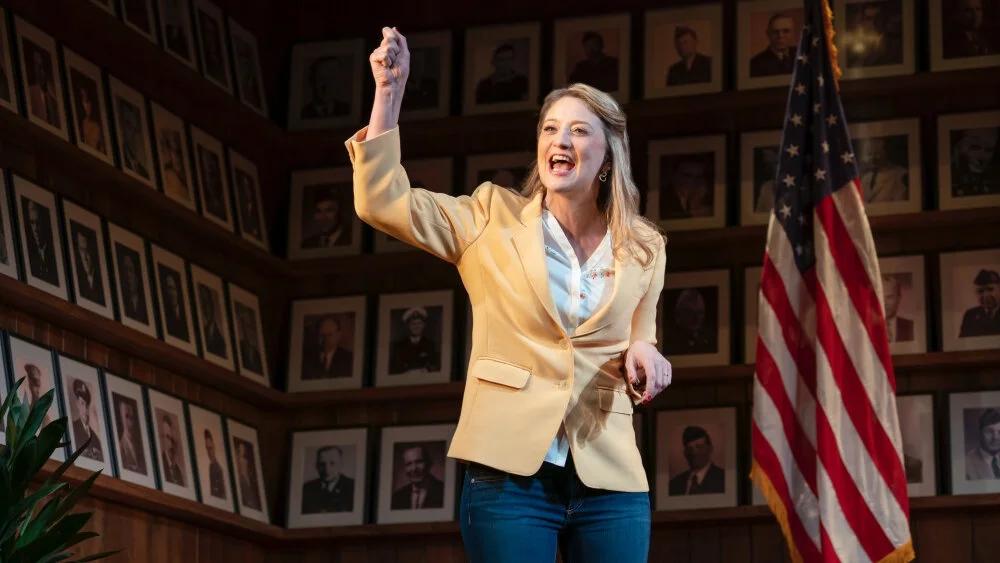What the Constitution Means to Me
As a teenager, playwright and performer Heidi Schreck visited many American Legion Halls, giving speeches on the Constitution that “drew a personal connection between your own life and the document” to earn money for college. After her prepared statement, she would speak about a randomly selected amendment.
This experience serves as the opening of What the Constitution Means to Me, the disarmingly inviting, undeniably powerful play that, directed by Olive Butler, opened on Broadway after a sold-out run at Off-Broadway’s New York Theatre Workshop. What follows Schreck’s flashback to her adolescence is a deeply personal invitation into her own life, reflecting on the Founding Father’s document and its effect on her and her family’s experience in America.
Dressed in jeans and a sunny yellow blazer, Schreck bounds onto Rachel Hauck’s set, warmly inviting the audience to sympathize with her and root for her to win as she compares the Constitution to a crucible — “is a living, warm-blooded, steamy document!” She is joined onstage by Mike Iveson, serving as the Legionnaire moderator and timekeeper. The 47-year-old Schreck’s re-creation of her adolescent enthusiasm is contagious; it inspired this critic to reflect back on her days at the Palmetto Girls State during the summer of 2001.
But Schreck soon grows up, and an adult, she also grows to realize that this document she spoke of so fervently was not made to protect her at all. Instead, it was “designed to do from the beginning, which is to protect the interests of a small number of rich, white property owners.”
Schreck subtly shifts from her teenage self to the present day, where her thoughts on the Constitution inspire much more somber reflection. For this document, intended to protect the rights of Americans is far from protecting more than half of the population.That half includes Schreck, as well the women in her family, whose histories she shares in a deeply moving, intimate way. Enforced institutionalization and domestic abuse are part of her family’s history, and through those memories Schrek illustrates how vulnerable women are because of the Constitution — a document in which the word “woman” is never mentioned. (“Our bodies had been left out of the document from the beginning.) Despite the 15th Amendment guaranteeing the right to vote regardless of “race, color, or previous condition of servitude,” gender is not mentioned. And the Equal Rights Amendment, first introduced in 1972, has yet to be ratified.
Audiences listen to Schreck talk of her great grandmother, a mail-order bride who suffered from melancholia and was institutionalized and the domestic abuse her grandmother suffered. Accounts of violence, both mental and psychological, sexual assault and lack of reproductive justice are in the narrative, but Schreck’s warmth and sincerity prevent its becoming polemical and the humanity of the stories are so inviting that the facts almost slip past unnoticed. (A recording of Supreme Court justices discussing the 1965 Supreme Court case Griswold v. Connecticut is both horrifying and entertaining.)
The stories of Schreck’s family they further illustrate just how vulnerable women are, while inspiring reflection on masculinity as well as the patriarchy. At one point, Iveson sheds his role of timekeeper and joins Schreck onstage to reflect on his own gender and sexual identity and the role of masculinity in culture.
What the Constitution Means to Me is a truly unique performance to be seen on Broadway. Its arrival in Times Square, where a shortage of original works by women has persisted, is something to celebrate. Schreck’s play is both tragic and comic, and its timing is uncanny. Watching it can be triggering and reassuring, depressing and inspiring. The evening closes with Schreck debating one of two teenagers — Rosdely Ciprian and Thursday Williams — on whether the Constitution should be abolished. Both young women are remarkably smart and self-assured, and their debates with Schreck are impressive. Witnessing two young women who aren’t even old enough to vote speak so passionately of a 230-year-old document and its role in American government, inspires flickers of hope for actual change.

